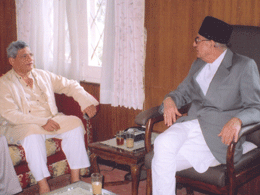 People's Democracy
People's Democracy
(Weekly
Organ of the Communist Party of India (Marxist)
No. 18
May 06, 2007
(Weekly
Organ of the Communist Party of India (Marxist)
|
Vol.
XXXI
No. 18 May 06, 2007 |
Nepal: Birth Pangs Of Democracy

Yechury discussing with Nepal prime minister G P Koirala in Kathmandu on April 24
Sitaram Yechury
THE situation in Nepal continues to be beset with complications and twists in the countryís march to establish a stable democratic order. This is only natural because, as we have stated in these columns a year ago, the roadmap that was evolved then was for a road that was not travelled upon. When the journey begins, we had anticipated that there would be many pot holes and curves that need to be negotiated carefully. This process is now under way.
I visited Nepal on April 24 and 25 at the invitation of prime minister Koirala, on the first anniversary of the defeat of the Kingís emergency rule and the restoration of the parliament. The Nepali people were celebrating the first anniversary of this historic victory as `Loktantra Divasí.
Significant distance has been travelled on this road to democracy. The parliament has been expanded to include the Maoists. The Maoists have joined the interim government. An interim constitution has been adopted. The combatants of the Maoist Peopleís Liberation Army (PLA) have registered with the United Nationís authorities. Their arms have been nearly completely surrendered. They are now housed in seven central camps. Each of these have three satellite camps. In these seven central and 21 satellite camps, nearly 36,000 combatants are being sheltered.
There are problems concerning the living conditions and other facilities in these camps. I had the rare opportunity (certainly the first foreigner apart from UN personnel) to visit one of these camps in interior Nepal. This was Division No. 3 of the PLA with 5,966 combatants located at the Jhutpani village in the Chitvan district. The main issue with the combatants is, naturally, the question of their rehabilitation and future gainful employment. Various proposals are being considered by the government and during the course of my discussions with Maoist chairman, Prachanda, and Baburam Bhattarai, possibilities of converting some of these combatants into units of paramilitary forces like forest protection force etc were discussed. In any case, the sooner these decisions are taken, the better. In the two long discussions I had with the chief of the UN mission, it was clear that the international agencies were also prepared to assist Nepal in conducting programmes of providing skills and rehabilitation to these combatants.
However, one crucial element of the roadmap has been delayed. This is the elections to the constituent assembly which were planned to be held in June. The newly-constituted Election Commission felt that due to the large-scale disturbances in Nepalís plains, known as the terrai, preparations for the elections could not take place properly. These have hence been postponed. From July onwards, the monsoon sets in and it would be impossible to hold elections till the end of September. October is a month of religious festivals. Hence, the earliest possible opportunity for holding elections would be end-October or beginning November. If this window of time is lost, then elections can only be held post-winter next year. This will, naturally, compound the existing uncertainties. Hence, the universal concern is to work for holding these elections as early as possible. It is this constituent assembly which shall decide the future constitutional order of democratic Nepal including the status of the monarchy. The overwhelming popular opinion in Nepal, however, is for a republican democratic order sans the monarchy.
During our earlier discussions, we had suggested that the process of constituting through elections the constituent assembly must be an all-inclusive process. The recent disturbances in the Terrai have been fuelled by a justifiable perception by the people there, known as Madeshis, that they are not getting their due. Under the feudal monarchy, the Madeshis, the Jana Jatis (tribals), and the dalits were denied equal rights. It is only natural that these sections should aspire for equality and justice in the aftermath of the massive peopleís movement for restoration of democracy. Speedy discussions to evolve an all-inclusive process for the constituent assembly elections, thus, constitutes an important element in the evolution of Nepalís future. This is the essence that I gathered in the two long discussions with CPN(UML) general secretary, Madhav Nepal. I also had discussions with former prime minister Sher Bahadur Deuba.
The only way in which these issues can be resolved is by strengthening the unity and the political understanding achieved between the Seven Party political alliance and the Maoists. Since after the Maoists joined the interim government, this is referred to as the `eight party allianceí. Needless to add, there would be forces both domestic such as the monarchy and international who do not wish to see the Maoists in a democratic government. In the meanwhile, the opportunities for a future alliance of Left forces is being explored to advance a radical agenda for Nepalís future.
From the Indian side, we conveyed that India is firmly committed to the evolution of a stable democratic order in Nepal. The solidarity of the Indian people with our Nepali brethren remains uncompromising in this ongoing making of history in Nepal.